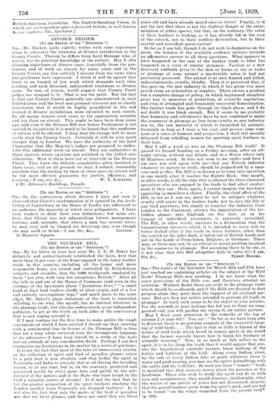THE PLUMAGE BILL.
[To THE EDITOR OF THE " SPECTATOR."] SIR,—By his letter in your last issue Mr. J. E. H. Baker has definitely and authoritatively established the facts, first that more than 75 per cent. of the firms engaged in the fancy feather trade in this country, including all the larger and more responsible firms, are owned and controlled by British-born subjects, and secondly, that the 3,000 workpeople employed by them " are also, with very few exceptions, British." After all the talk in and out of the House of Commons (and even in the columns of the Spectator) about " Levantine Jews," " a small band of East End traders chiefly of alien origin, and of a low and entirely unscrupulous type," and much more to the same effect, Mr. Baker's plain statement of the facts is somewhat startling to one who, like myself, has no interest whatever in the plumage trade, but who has endeavoured, as an independent publicist, to get at the truth on both aides of the controversy that is now raging around it.
If I may venture for the first time to make public the rough conclusions at which I have arrived I should say that, starting with a sentimental bias in favour of the Plumage Bill—a bias that for a long while survived even the intemperate language of its advocates—I have been forced by a study of the facts into an attitude of very considerable doubt. Perhaps I can best summarize my hesitations in the matter by a series of questions. . Is it not the fact that most of the tales of unnecessary cruelty in the collection of egret and bird of paradise plumes relate to a part that is now obsolete, and that to-day the egret in Venezuela and India is scarcely shot at all during the breeding season, or at any time, but is, on the contrary, protected and preserved partly by strict game laws and partly by the self- interest of the natives and of the State who have found in the bird a. valuable source of income? Is it not the fact that by far the greater proportion of the egret feathers reaching the I.ondon market from Venezuela are dropped feathers? Is it not also the fact that only the males of the bird of paradise are shot for their plumes, and these not until they are three
years old and have already mated once or twice? Finally, is it not the fact that there is not the slightest danger of the exter- mination of either species, but that, on the contrary, the value of their feathers is leading, as it has already led in the.case of the ostrich, not to their reckless destruction, but to their careful and nrovident preservation?
So far as I can tell, though I do not wish to dogmatize on the point, the balance of the available evidence inclines towards an affirmative answer to all these questions. What appears to have happened in the case of the feather trade is what has happened in a score of similar instances. Fashion or a new discovery suddenly gives tto the skin or horns or fur or tusks or plumage of some animal a marketable value it had not previously possessed. The animal is at once hunted and killed, indiscriminately, cruelly, blindly. Then it is perceived that, if this goes on, the new industry to which it has given rise must perish from an exhaustion of supplies. There ensues a gradual but a complete change of policy, in which haphazard slaughter gives way to measures of protection, of scientific regulation, and even of attempted and frequently successful domestication. The feather trade has gone through its black phase, and I do not doubt it was black enough. But it seems to me probably that humanity and self-interest have by now combined to make the commerce in plumage as free from cruelty as any industry can be, the raw material of which is furnished by animals. Certainly so long as I wear a fur coat, and possess some rem- nant of a sense of humour and proportion, I shall feel morally debarred from rebuking women for sporting egret.feathers in their hats.
May I add a word or two on the Plumage Bill itself? It passed its Second Reading on a Friday morning, after an all- night sitting, without any debate, and in a House where only 69 Members voted. It does not seem to me right—and here I am sure you will agree with me—that any British industry whatever its nature or study, should be jeopardised by a snap- vote such as this. The Bill is so drawn as to come into operation in one month after it reaches the Statute Book. One month, in other words, is all the time that is allowed the three thousand operatives who are engaged in the trade to find other employ- ment if they can. Here, again, I cannot imagine the Spectator approving so merciless a clause. Finally, the chief effect of the Bill, so far as I can see, must be not to mitigate whatever cruelty still exists in the feather trade, not to save the life of any bird anywhere, but simply to transfer the industry from London to the Continent, whence the importation of the for- bidden plumes into England, on the hats or in the luggage of individual passengers, is expressly permitted. The Bill, in other words, amounts to a declaration that the humanitarian interests which it is intended to serve will be better looked after if the trade in fancy feathers, other than the ostrich or the eider duck, is taken out of British hands and put in the hands of Frenchmen, Belgians, or Germans. There may, or there may not, be an ethical or moral problem involved in the commerce in plumage. But assuming there to be one, is i•t not clear that this Bill altogether fails to solve it?—I am,


































 Previous page
Previous page